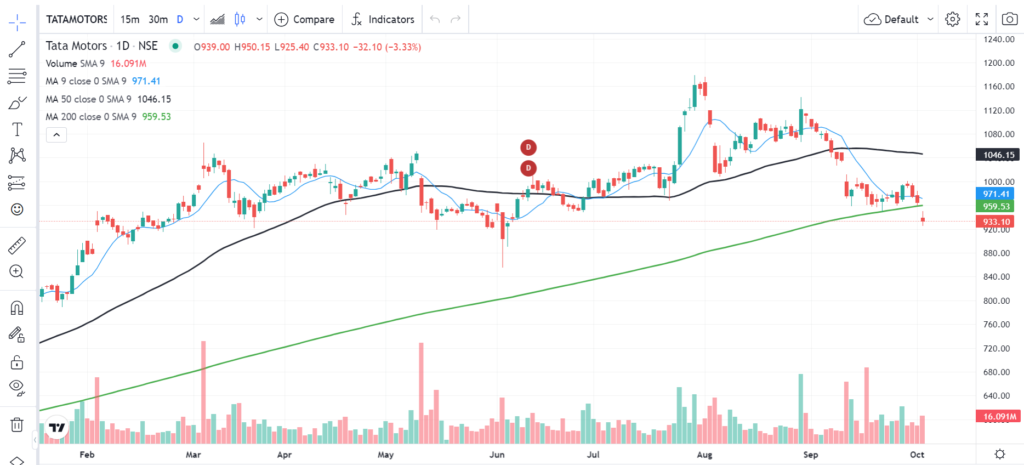Tata Motors stock price has seen significant volatility recently, dropping by 3% to ₹936.90 on October 3, 2024, following news of a substantial sales decline in September. The market capitalization of the company fell to ₹3.48 lakh crore, with a high trading turnover of ₹18.80 crore in early deals. This dip comes as the company faces multiple headwinds, particularly in its electric vehicle (EV) segment and regulatory environment.
Tata Motors Share Price and Chart

Recent Trends and Moving Averages
Over the past year, Tata Motors share price has exhibited impressive growth, with the stock rising over 52%. However, it has faced some downward pressure more recently, trading below key moving averages like the 5-day, 10-day, 20-day, and 200-day moving averages. This signals a cautious market sentiment, especially in light of its recent 11% sales slump in September.
The short-term moving averages suggest a bearish outlook, indicating that investors may need to be vigilant about potential further declines. The share price drop coincided with weaker sales numbers for both internal combustion engine (ICE) vehicles and EVs.
Tata Motors Financial Metrics
Tata Motors’ financial performance has remained strong despite short-term challenges. Over the past year, the company’s stock has provided significant returns, outperforming key competitors. However, the beta value of 1 suggests that the stock has experienced average market volatility, implying moderate risk for investors. The company’s robust market capitalization and relatively stable liquidity provide a cushion against these fluctuations.
Despite the volatility, Tata Motors continues to invest heavily in its long-term strategy, particularly in EVs, which have been a focal point of its growth plans.
Electric Vehicle Strategy and Market Impact
Tata Motors has aggressively pursued the EV market, with models such as the Nexon EV, Punch EV, and Tiago EV leading its portfolio. However, recent sales figures indicate a drop in EV sales, partly due to the withdrawal of incentives under the FAME II scheme, as well as the expiration of road tax waivers in key Indian states.
To counteract this slowdown, Tata Motors has introduced discounts of up to ₹3 lakh on select EV models during the festive season. These aggressive pricing strategies are aimed at reviving demand and strengthening its foothold in India’s EV market. The company has also announced strategic partnerships and investments, including a plan to invest ₹9,000 crore in a new manufacturing facility in Tamil Nadu for next-gen vehicles, which aligns with its long-term EV ambitions.
On the international front, Tata Motors’ subsidiary, Jaguar Land Rover (JLR), is also focusing on EVs. JLR’s recent announcement of a £500 million investment to retool a UK factory for EV production underscores the company’s commitment to a sustainable future. These developments are crucial as Tata Motors continues to compete against other global automakers, particularly in the burgeoning EV market.
Institutional and Retail Investor Sentiment
Investor sentiment around Tata Motors has been mixed, reflecting the broader uncertainties in the global auto market. While institutional investors remain cautiously optimistic due to the company’s solid EV strategy and diversification, retail investors have expressed concerns about the impact of regulatory changes and supply chain issues.
Institutional investors are particularly drawn to Tata Motors’ ability to weather market fluctuations, thanks to its diversified portfolio, including commercial vehicles and luxury offerings through JLR. However, the recent decline in sales, coupled with increased competition in the EV space, has led some investors to adopt a wait-and-see approach.
Corporate Developments and Strategic Partnerships
Tata Motors has been actively pursuing several strategic partnerships to strengthen its market position. In September 2024, the company secured a significant contract to supply armored vehicles to Morocco’s defense forces, developed in collaboration with the Defense Research and Development Organization (DRDO). This diversification into defense manufacturing demonstrates Tata Motors’ ability to leverage its engineering capabilities for non-automotive sectors.
In addition, Tata Motors has broken ground on a new world-class manufacturing facility in Tamil Nadu, designed to bolster its production capacity for next-generation vehicles, including EVs. This move signals the company’s long-term commitment to maintaining its leadership position in India’s automotive market.
Risks and Regulatory Factors
One of the key risks Tata Motors faces is the changing regulatory landscape, especially concerning EV subsidies and emissions norms. The expiration of the FAME II subsidies has already impacted fleet sales, and the non-inclusion of the fleet segment in the PM-eDRIVE scheme has created further uncertainty.
Moreover, Tata Motors is also navigating a complex legal environment, including a recent court directive to compensate an EV customer for a fire-related incident. Such regulatory and legal challenges could affect the company’s reputation and financial standing if not managed carefully.
Future Outlook
The outlook for Tata Motors remains cautiously optimistic. The company’s commitment to EVs, bolstered by significant investments in production capacity and product development, positions it well to capitalize on the growing demand for sustainable mobility solutions. However, short-term risks related to regulatory changes, fluctuating demand, and competitive pressures must be carefully managed.
The stock’s current performance, which is lagging behind key moving averages, suggests that the near-term market outlook may be volatile. Nonetheless, Tata Motors’ diversified portfolio, international expansion, and strategic investments in both traditional and electric vehicles provide a solid foundation for long-term growth.
Overall, while there are immediate challenges, particularly in sales and regulatory hurdles, Tata Motors’ strategic initiatives in the EV sector and international markets could yield positive returns for investors with a long-term horizon. However, investors should closely monitor market trends, particularly in the EV space, to gauge the company’s ability to meet its ambitious goals.